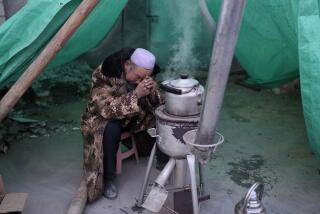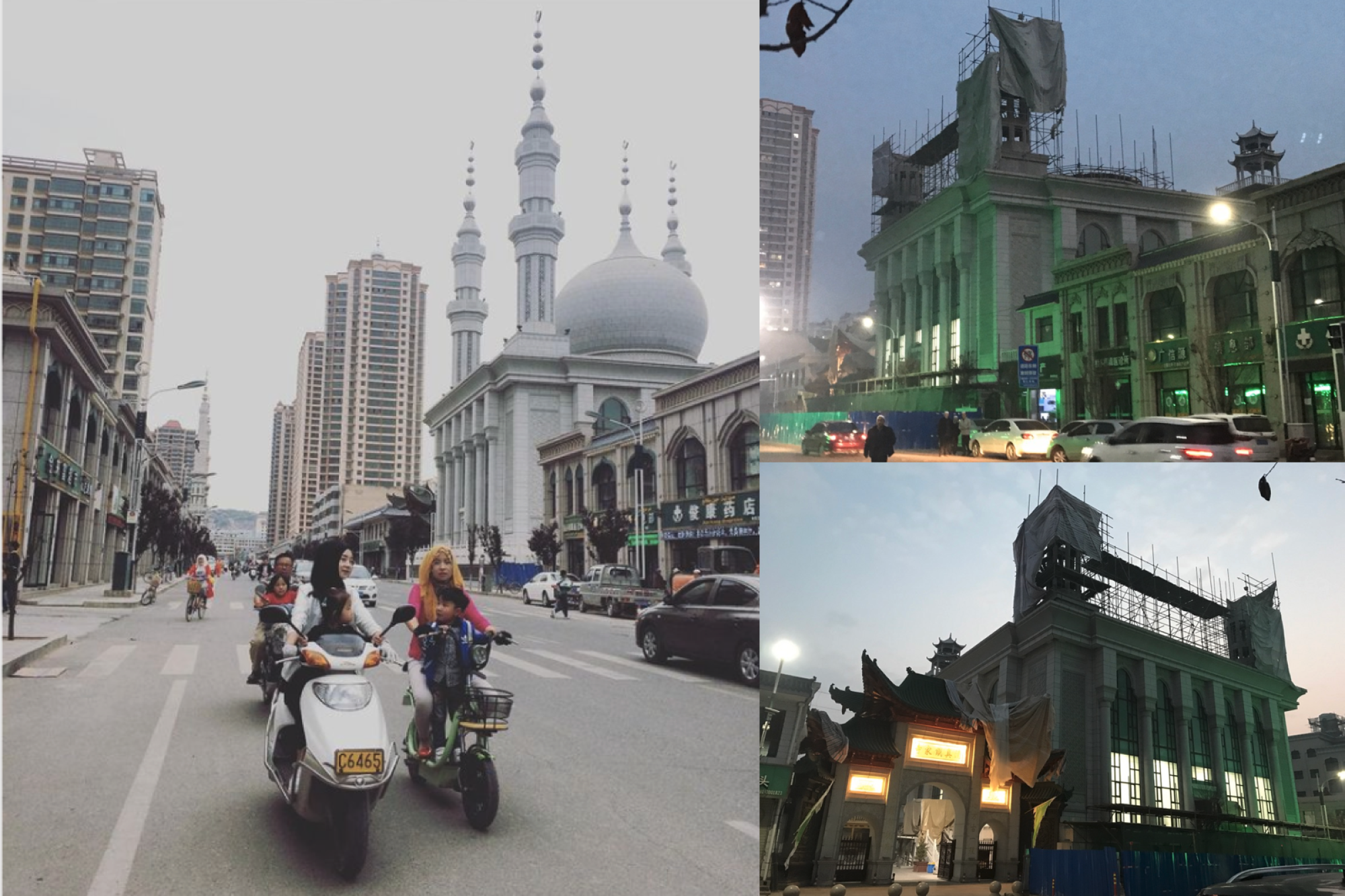
- Share via
LINXIA, China — The morning ritual began as dozens of men in traditional white skullcaps filed quietly into mosques, nodding to one another in the chill of an autumn twilight.
But there was no call to prayer. Another less spiritual message flashed silently in red characters on a screen across from one of the mosques: “STRENGTHEN ETHNIC UNITY, MAINTAIN SOCIAL STABILITY.” Surveillance cameras swiveled at the sign’s two sides. The men passed by them to praise God.
The rising sun revealed that the domes and minarets on the city’s three grand mosques, each home to a different Islamic sect of the Hui people, a Chinese Muslim minority, had been snapped apart and scooped away. Bamboo scaffolding had been put up for renovations that would further strip the mosques of their identities.
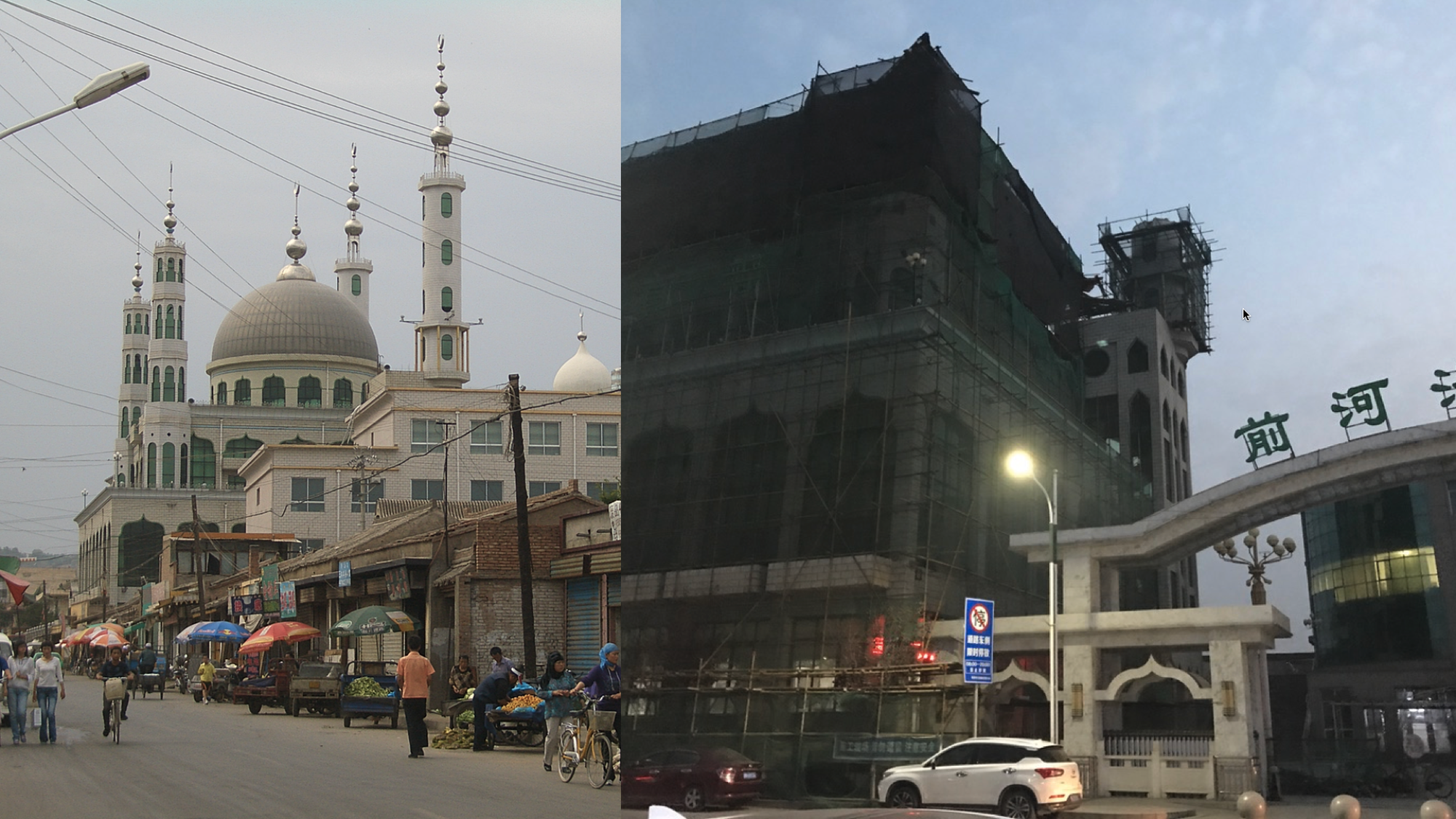
Here in the minority heartland of northwestern China’s Gansu province, a social engineering initiative that offers improved livelihoods while demanding a shift from religious to political devotion is underway. It lies at the intersection of two nationwide campaigns: the “Sinicization of religion” to erase foreign influence and bring religion under state control, and the eradication of poverty through mass resettlement, job training and sending cadres into villages to teach the Communist Party’s will.
The campaigns are signature designs of Chinese leader Xi Jinping. They are reshaping a land of red mountains and minarets, filled with minority languages and faiths born of ancient mingling on the Silk Road. Their aim is to mold a future patterned after Han-majority China, with urban jobs, material dreams, and strengthened loyalties to the party and its leader.
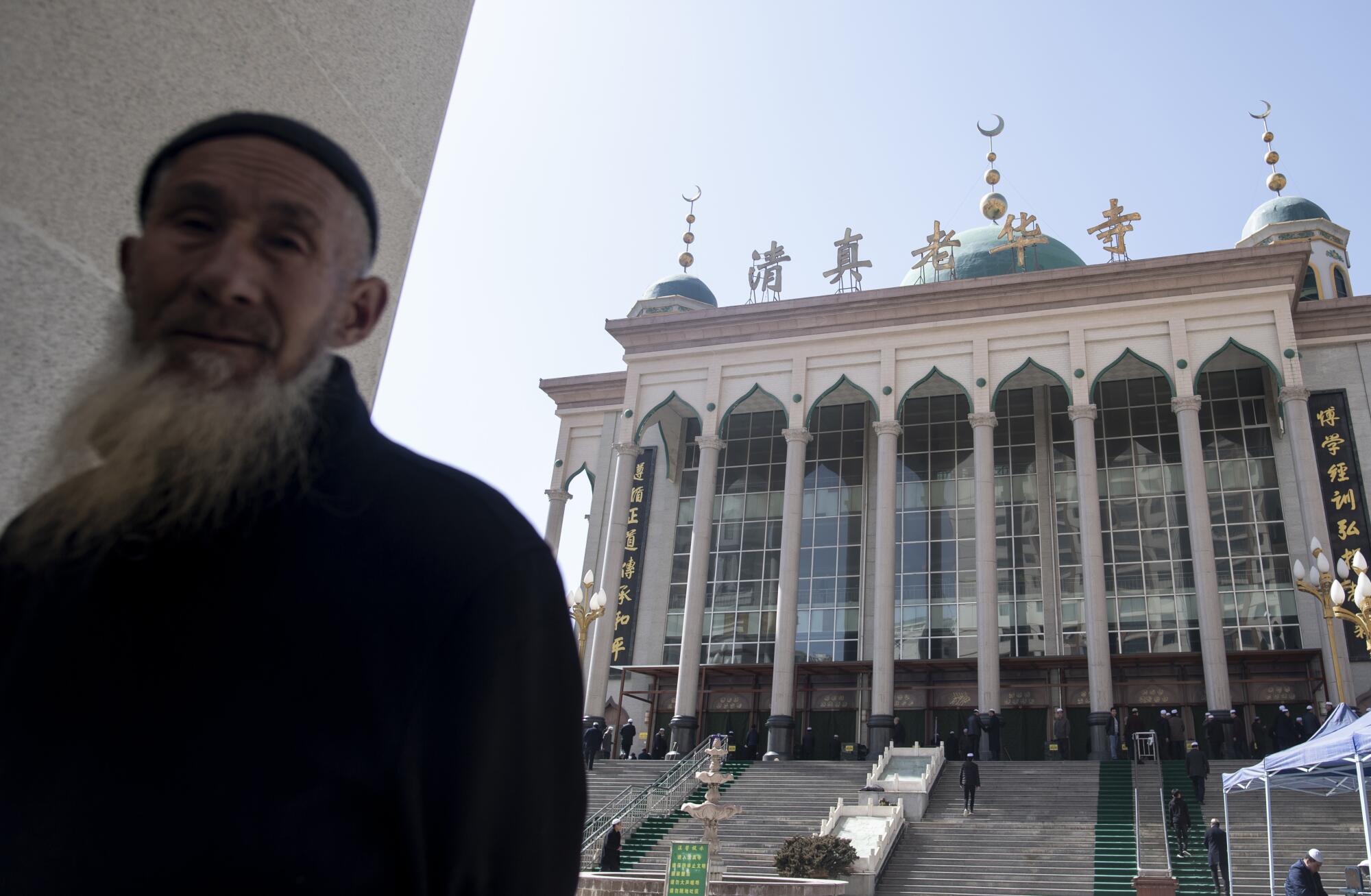
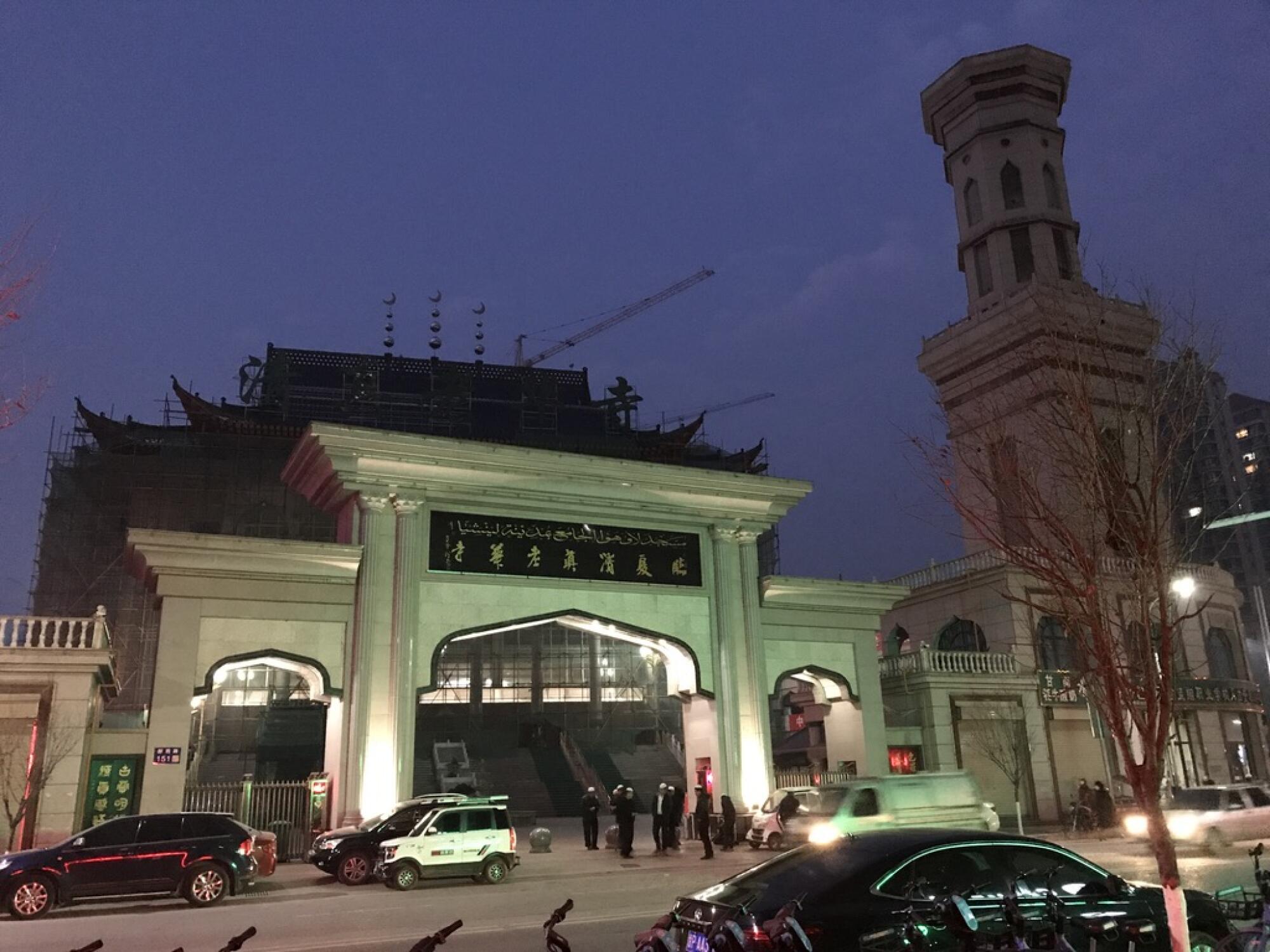
Three men walking out of mosques in Linxia, a city once nicknamed “Little Mecca” for its many Islamic communities, separately confirmed that the religious buildings had been partially demolished while many people remained indoors during the COVID-19 pandemic. The domes and minarets built in “Arab” or “Saudi” style were to be replaced with Chinese-style roofs meant to promote a more “Sinicized” version of Islam.
“It just happened all of a sudden,” said Ma Hassan, 36, a local hotel businessman. “They came up with this policy of de-Saudi-ification, de-Arabization, and that was it. We accepted it — how could we not? The government decided.”
“They’re controlling us,” said Ma Zhongxian, 55, a local Hui businessman who had attended morning prayers, “but mostly the next generation will be affected. They will probably lose their faith, or it will be diluted.”
Adults had relative freedom to worship, he said, but Communist Party cadres, following new state guidelines, sat outside the mosques to ensure no minors entered for Friday prayers. Summer religion and Arabic schools once attended by many Hui children were banned. The call to prayer was forbidden as a “public nuisance,” Ma said, despite Muslims making up 60% of Linxia’s population.
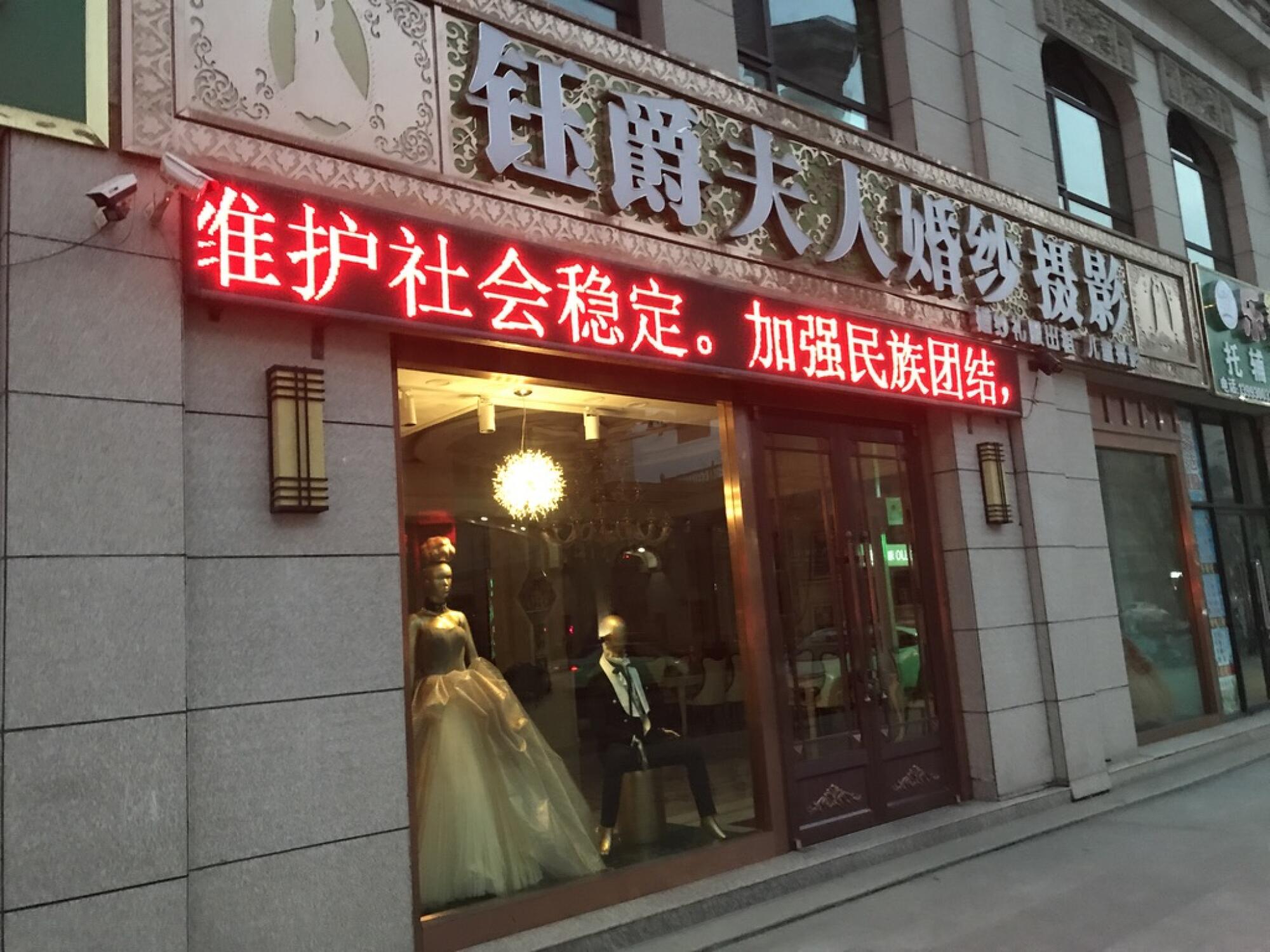
A Times reporter visited the damaged mosques during a government-organized tour of Gansu to showcase poverty alleviation efforts. The mosques were not part of the itinerary. But a Linxia propaganda official confirmed that they had received orders from the central government to combat “Arab-ization, Saudi-ization, and pan-Islamification” in Gansu, and to restrict mosque-building and participation in the hajj, an annual Islamic pilgrimage to Mecca.
“We are worried about foreign infiltration and religious extremism. That’s a global phenomenon,” said the official, who asked not to be named because he was not supposed to discuss the new religious controls. No extremist attacks or activity had happened in Linxia, he said. But the policy was preemptive and came from Beijing.
Officials’ approach to Gansu appears more relaxed than in neighboring Xinjiang, where Uighur minority Muslims have been detained en masse for forced “reeducation,” then either moved to prisons or shipped to low-wage factories for offenses including growing beards, having family members abroad or installing WhatsApp on their phones. Many holy sites there have been razed rather than refurbished with “Chinese” trappings.
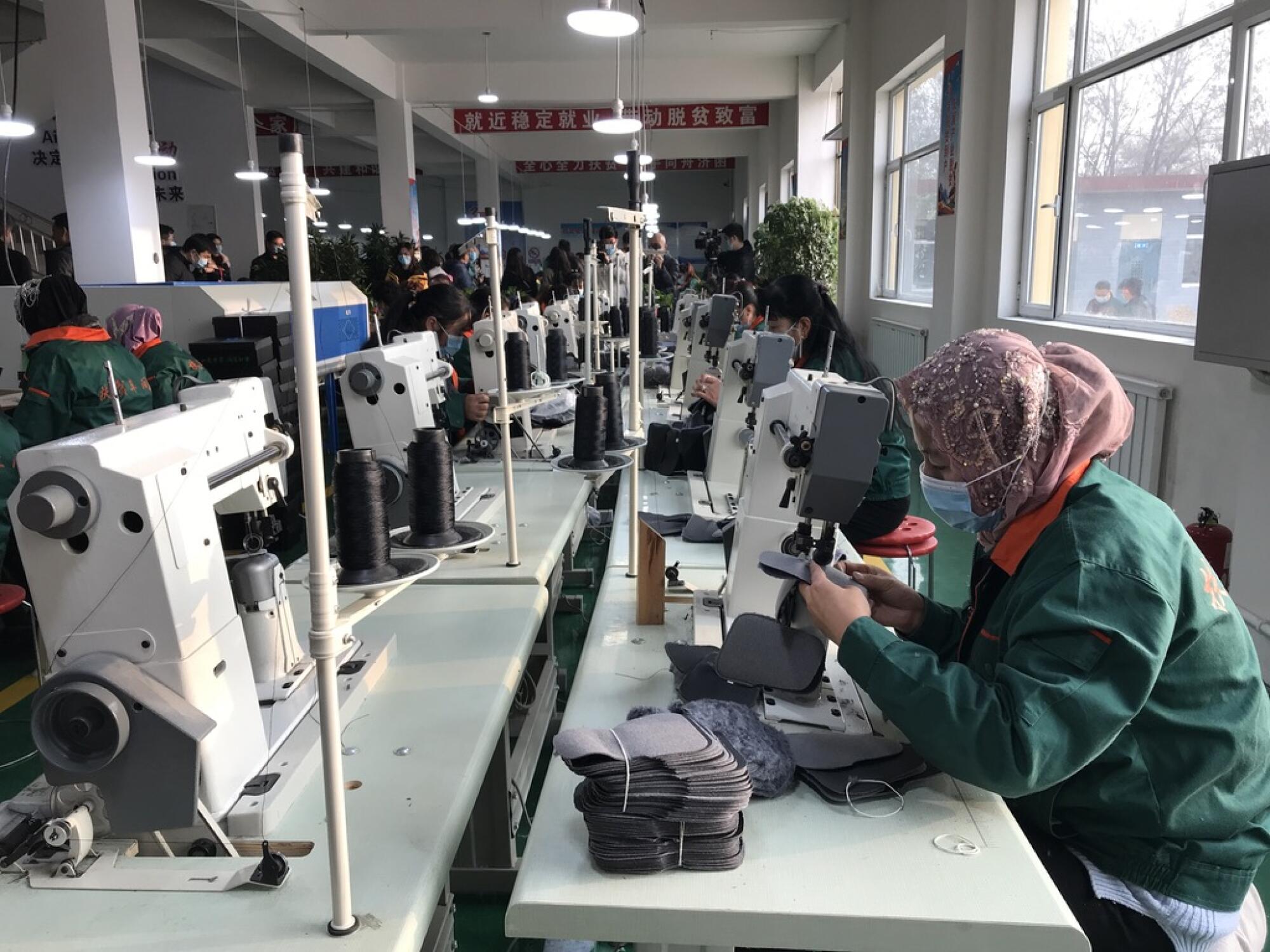
In a “poverty alleviation factory” on the outskirts of Linxia, rows of women — some wearing hijabs, all in uniforms and face masks — sewed shoe interiors together and packed them in boxes. An official spoke proudly of how the factory had “transformed people’s thinking” and provided income to conservative housewives who traditionally rarely left their homes.
One of the Hui factory workers, Mafutumai, 30, said her thoughts had been “transformed.” She had stopped attending school after age 13 and married at 18. She had done only housework for the last 15 years. “Religious thinking” had taught her that women should stay home, but now she was making roughly $380 a month, which she liked.
At the same time, she said she was proud to fast during Ramadan and wear her hijab at the factory. If the bosses asked her to remove it, she would resist. “I’m Hui and that’s who I am,” she said. “I wear hijab and that’s what I do.”
The factory manager, Song Wenkai, 39, hailed from Xiamen, a wealthy coastal city in southern China where his company had been manufacturing shoes for 20 years. Xiamen and Linxia were part of a government initiative linking eastern and western cities and subsidizing factories to open branches in poor parts of China like Gansu, he said.
The factory in Linxia paid no rent or electricity fees but was not turning a profit. The workers were less efficient than Xiamen’s workers, but he paid them half the salary and did not provide social benefits. Rising wages and stricter enforcement of labor laws in eastern China had already pushed many factories to move to Southeast Asia in recent years. It made sense for Song’s company to move to minority regions in western China instead; he said he could keep the supply chain domestic, use cheaper labor and fulfill a “political duty.”
“It will get better in the long term,” Song said. “The labor is plentiful and the government is helping.”
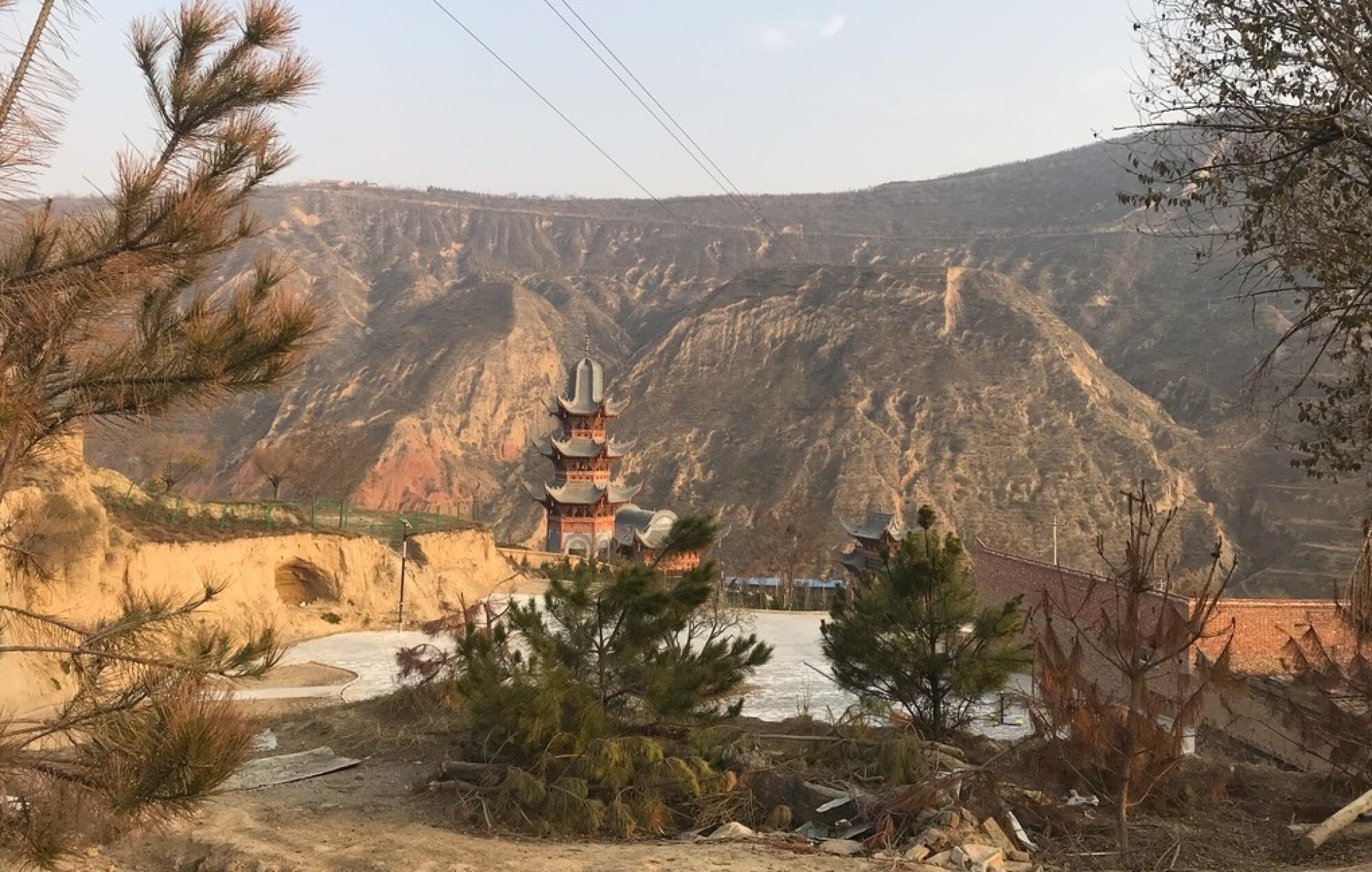
Such government help — and thought reform — is also reaching into villages like Bulengou, part of the Dongxiang region, home to a Muslim minority of just over 600,000 people. Descended from Mongols who intermarried with Central Asians, Dongxiang people are one of the poorest groups in China, with historically low literacy rates and difficulty farming and herding sheep in mountain villages.
They speak a Mongolic tongue interspersed with Mandarin, Persian, Arabic and Turkic words, a testament to the people who once passed through this remote pocket of Gansu.
On the road approaching Bulengou, two icons towered over the village: a gongbei, an old Islamic-Chinese religious structure in rusty shades of red and blue, and a bright red billboard quoting Xi Jinping. The gongbei was enclosed behind a padlocked gate, with a sign forbidding photos. The Xi billboard welcomed visitors to a museum honoring Xi’s visit to the village in 2013, with images and video of grateful Muslims flocking to see the party leader.
Inside, a Dongxiang man posed with running water from a faucet printed with the slogan: “Drink water while thinking of the General Secretary/Give thanks to the Communist Party forever.” State media reporters crowded around, snapping photos as a cadre told the man how to position his hands.
Every villager had been given an identical faucet as part of the poverty alleviation drive, which had also brought smooth roads, relocations to new homes and job training. The improvements transformed the village — while cadres transformed villagers’ thoughts.
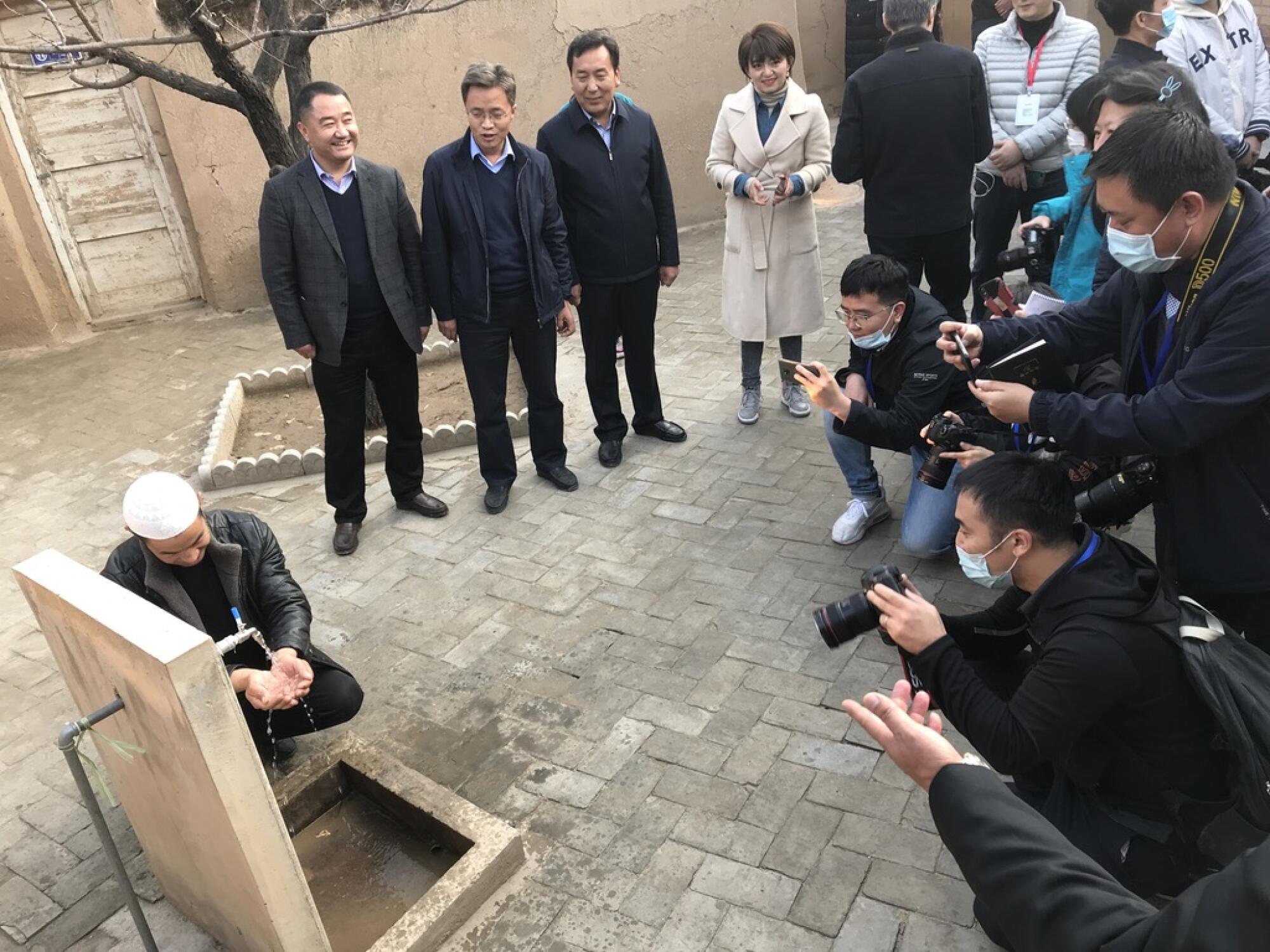
Yang Cheng, a cadre from Xiamen who’d been sent from state-owned oil and gas company Sinopec to work in Bulengou since January 2019, explained that his primary job was grass-roots party-building. He educated the villagers on party policies and trained new, younger party members who would renounce their religion when they joined, in accordance with party rules. So far there were 19 party members out of 315 villagers, he said.
“They have this problem because they grew up in this environment. But once you’re absorbed in the party, you give that up to follow party rules. You become a leader,” he said. In recent years, local schools had enforced strict Mandarin teaching and forbade students to participate in religious activities like fasting during Ramadan, he said: “The children have no religious education now.”
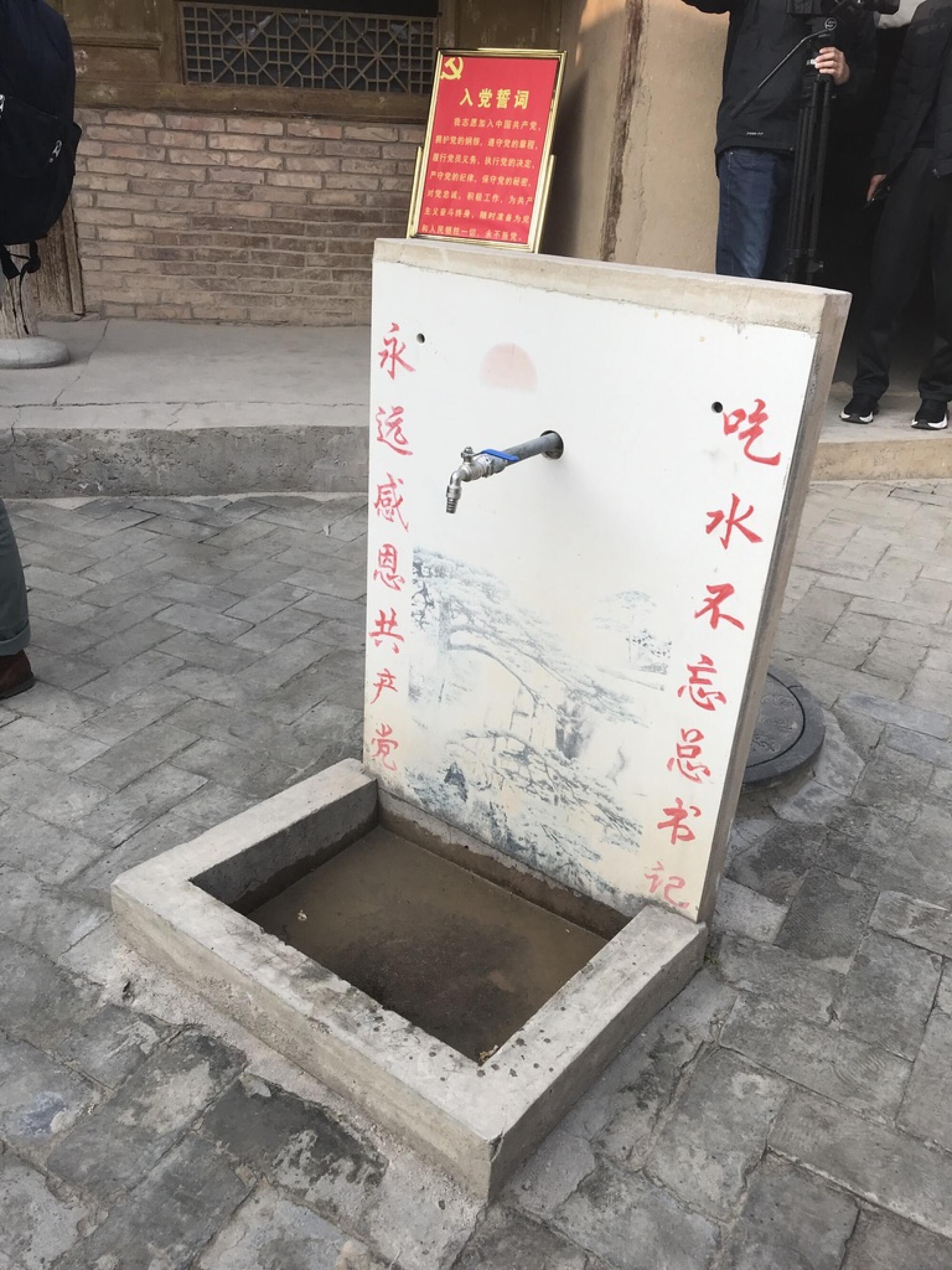
Inside one of the new Dongxiang homes, a woman named Maruru, 67, spoke Dongxiang to her 3-year-old grandson, Hassan. His older siblings all switched to Mandarin once they started school. They would probably forget Dongxiang altogether before long, she said.
But Maruru was more worried about money. She has two older grandchildren in school in Linxia and Lanzhou who needed nearly $100 a week for living expenses. Her daughter-in-law was making $9 a day embroidering in a poverty alleviation project. Her son was a migrant worker earning about $27 a day. It wasn’t enough, she said.
Her husband, Mawumaile, 72, agreed. “We don’t have any culture. We just want to have enough to eat,” he said. He had grown up in the mountains herding sheep and never attended school. All he wanted now was for his grandchildren to have an education and a future. A party cadre sat in the room, listening and nodding as he spoke.
But when Mawumaile was asked about the gongbei, he sat up and puffed out his chest. “That tower has been here for a thousand years! It was brought by our Arab ancestors. It is a sign of our people,” he said as the cadre pursed his lips.
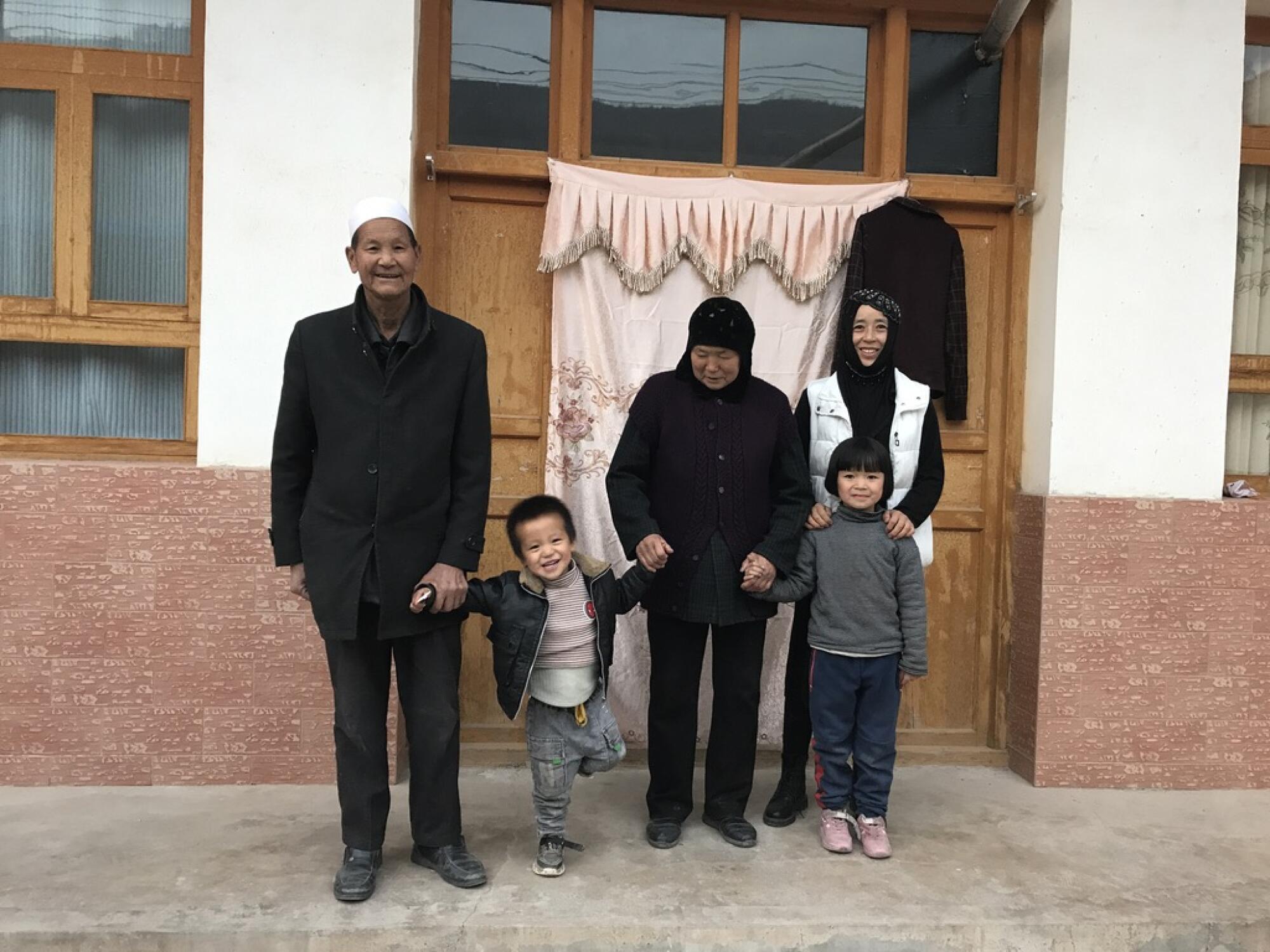
Hints of that pride in heritage remain even among some government workers. On a car ride with a Times reporter through the mountains around Bulengou, on a road so new there were no lights, Ma Fei, 30, a Dongxiang employee of the local propaganda department, spoke of how he taught Dongxiang to his son at home. “This language will be lost very soon,” he said.
Growing up, he remembered drinking melted snow and rainwater in his village home. The changes in recent years were good, he said, but had brought new questions about how to live — and whether some things from their previous lives should be preserved.
“In the past our biggest worry was whether we had enough potatoes. Now I can make money and change my own life,” he said. With the choices of modern, urban life flooding toward the region, he was glad to still have Islam as a guide. Some people associated religion with terrorism and extremism, he said, but they were wrong.
“Religion is not dangerous at all, especially among our people,” he said. “It cannot hurt our country’s interests.”
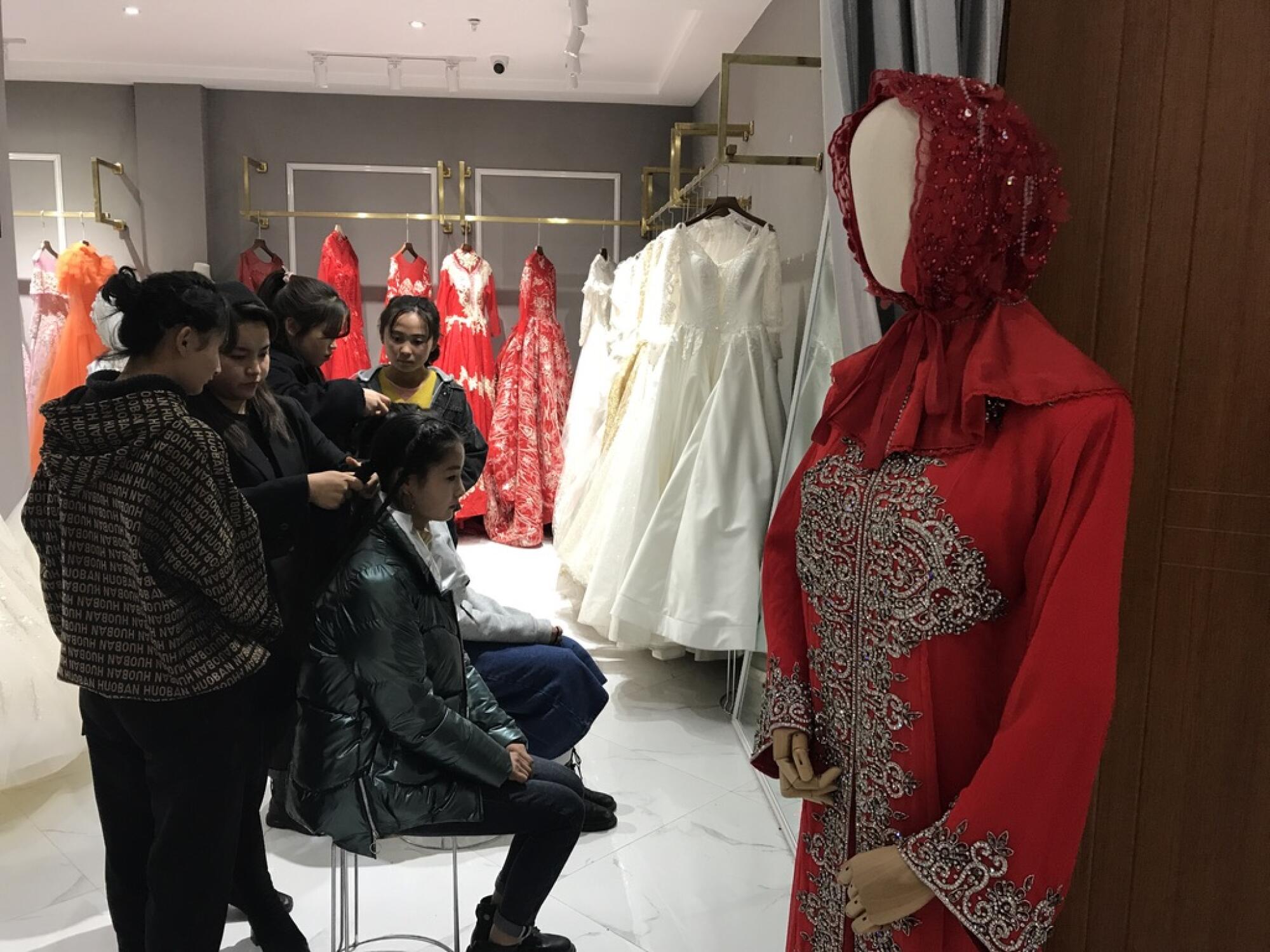
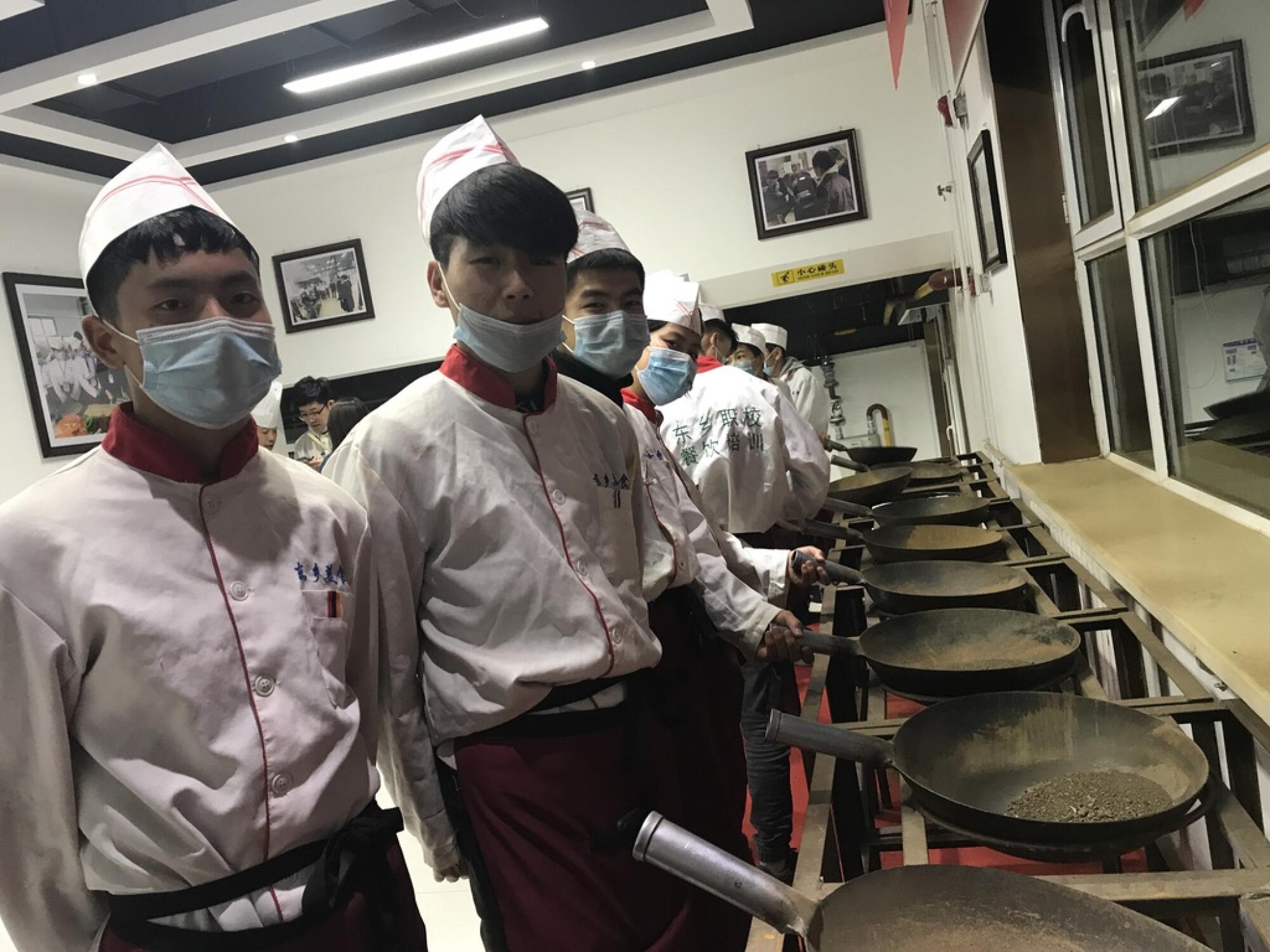
At a vocational school for Dongxiang students, another Xi quote was printed on the walls: “All happiness comes through struggle!” His message seemed to have convinced the dozens of Dongxiang youth who were receiving training to become beef noodle chefs or makeup artists. A row of teenagers stood in chef’s hats, aprons and face masks, practicing flipping their woks. Most had not made good enough grades to attend high school. Several of them said they didn’t speak Dongxiang.
Their ancestral language was not relevant to their dreams, they said, which were to get jobs in big cities, make something of themselves, and send money back home. One of the teens, Ma Guodong, 18, posted selfies in his chef’s hat and a video of him cooking on WeChat with motivational quotes: “As long as you work hard enough, the sun will shine through thick clouds into your life” and “Failure is not as bad as not trying. Everyone has a process of striving…”
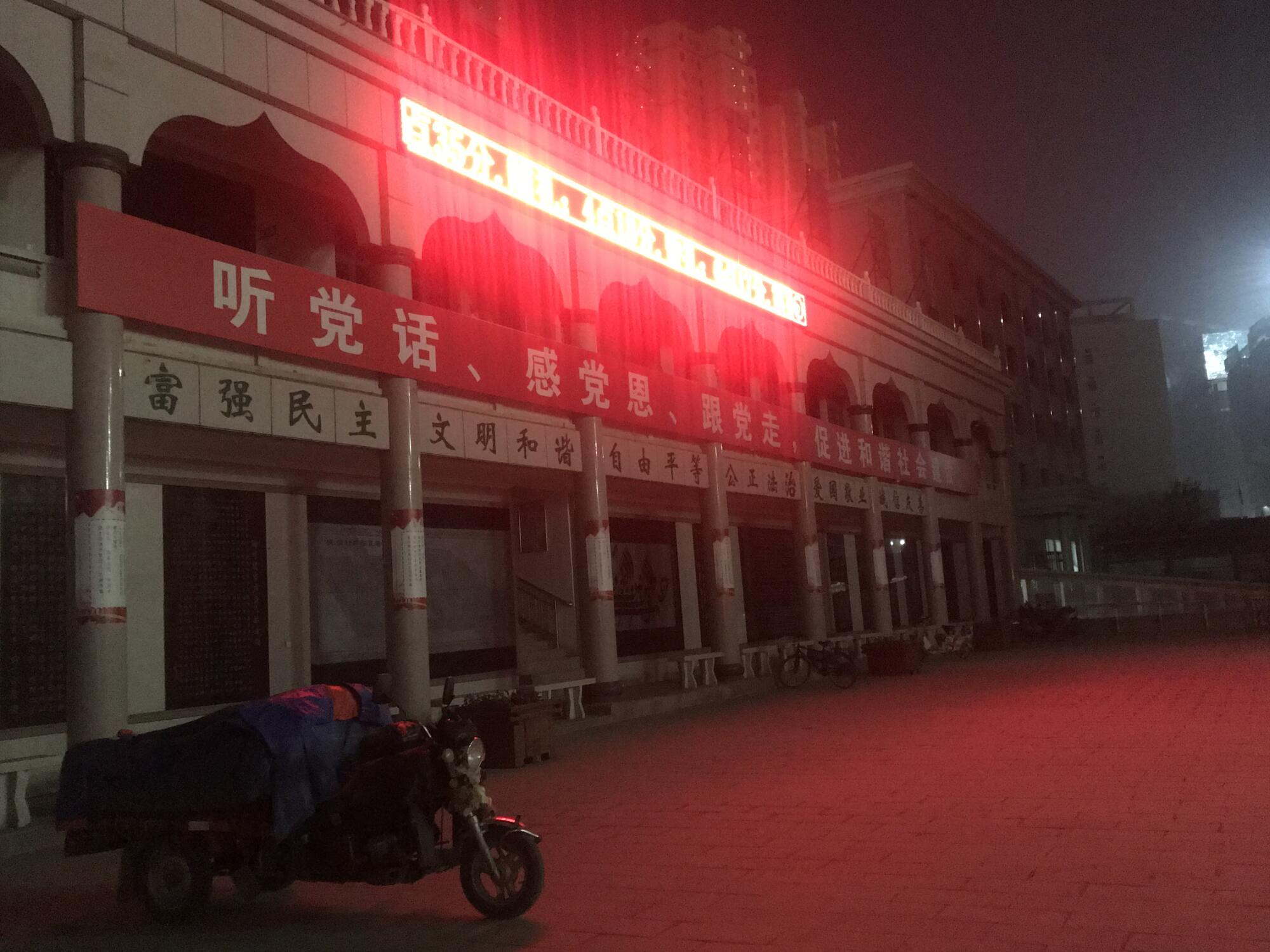
While language and religion are fading from the newly “Sinicized” generation, the older faithful have endured in quiet. Back in Linxia, Ma Zhongxian, the businessman, said he had visited Xinjiang last year and seen stricter restrictions on religious dress and entrance to mosques, and a far stronger security state.
“We are not as bad as them yet,” he said, though he suspected Gansu could soon go in the same direction. Local officials were already saying they needed to Sinicize Muslims for “security reasons.”
“Hui, Dongxiang, everyone is the same. They’re controlling us, not just in Linxia, but in the whole country,” he said. “Of course I am afraid, but what can I do? This is the nation’s trajectory.”
All he could do was to keep his own faith. He would walk past the minaret stumps at noon and pray again.
More to Read
Sign up for Essential California
The most important California stories and recommendations in your inbox every morning.
You may occasionally receive promotional content from the Los Angeles Times.


